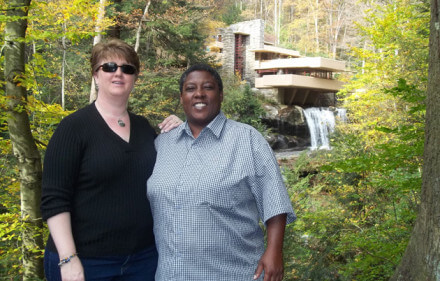BY ARTHUR S. LEONARD | An administrative panel of the US Court of Appeals for the Ninth Circuit has ruled that a former federal court employee in Oregon is entitled to compensation for the cost of providing health insurance for her same-sex domestic partner. The federal government’s refusal to recognize Oregon domestic partnerships in providing health benefits, the panel found, violates the Fifth Amendment of the US Constitution, as well as the Oregon district court’s non-discrimination policy.
The Executive Committee of the Ninth Circuit’s Judicial Panel, ruling on November 25, also found that the federal Office of Personnel Management (OPM), which denied the health benefits, had drawn the wrong conclusion from the June Supreme Court ruling in Edie Windsor’s successful challenge to the Defense of Marriage Act (DOMA).
The panel reversed a March ruling by Chief Judge Ann Aiken of the Oregon district court that had denied reimbursement for the health care costs.
In a federal employee grievance, judges say DOMA ruling applies broadly
The Judicial Council is an administrative body that deals with grievances from employees of the federal courts, who participate in employee benefits plans overseen by OPM. In 2009, Ninth Circuit judges, sitting in the same type of administrative panel, ruled on two grievances brought by federal court employees in California who had married their same-sex partners before passage of Proposition 8. The employees attempted to enroll their spouses under the federal plan, but OPM prevented that, citing DOMA.
In one of those cases, the clerk of the court that employed the party filing the grievance reimbursed him for the cost of his husband’s insurance. The other case, however, resulted in a federal lawsuit brought by Lambda Legal on behalf of Karen Golinski, in which a federal district judge ruled that DOMA’s ban on federal recognition of same-sex marriage was unconstitutional. When the Supreme Court upheld that position in Windsor’s case on June 26, the government’s pending appeal was dismissed and OPM changed its policy regarding legal same-sex marriages.
In July, OPM announced it would recognize same-sex marriages for purposes of federal employee benefit plans, regardless of where the employee and their spouse resided as long they married in a jurisdiction where it was legal. Taking a strict view of the Windsor victory, however, OPM said it could not recognize domestic partnerships or civil unions.
That position, taken across the board by the federal government, was the main point of contention in the New Jersey marriage equality litigation, persuading State Superior Judge Mary Jacobson to rule in September that same-sex couples in New Jersey were entitled to marry. Governor Chris Christie argued that the plaintiffs in that case should have sued the federal government to recognize their civil unions, rather than challenging New Jersey’s lack of equal marriage rights. But that argument cut no ice with the courts there, and when the State Supreme Court unanimously rejected Christie’s bid to have Jacobson’s ruling stayed, the handwriting was on the wall. The governor dropped his appeal, and same-sex marriages began.
The Oregon ruling responds to a 2009 grievance filed by Margaret Fonberg, a former law clerk at the federal district court there, who sought to enroll her registered same-sex domestic partner for the family health plan. OPM turned her down on the ground that the couple was not married. When Fonberg filed a grievance, Chief Judge Aiken initially ruled that denying health benefits to her partner because of her gender violated the court’s non-discrimination policy. The judge later rescinded a reimbursement directive finding that “no legal method for reimbursement is currently available and the law affords Fonberg no remedy in this matter.”
Fonberg’s appeal to the Ninth Circuit’s Executive Committee came before three judges — Chief Circuit Judge Alex Kozinski, Circuit Judge Richard R. Clifton, and District Judge Ralph Beistline, the chief judge of the Alaska district court. Their ruling notes that Oregon’s domestic partnership statute claims to “confer upon same-sex domestic partners the same rights and legal status as those conferred on married couples. In practice, however, it does not. Domestic partners are denied benefits from the federal government that are granted to married couples (including same-sex couples).
Fonberg was suffering discrimination in two ways, the Committee found. First, she and her partner “are treated differently from opposite-sex partners who are allowed to marry and thereby gain spousal benefits under federal law. This is plainly discrimination based on sexual orientation, which the District of Oregon’s [benefits plan] prohibits.” Fonberg and her partner, the Committee wrote, are also treated unequally with “same-sex couples in other states in the [Ninth] Circuit, who may marry and thus gain benefits [in the wake of the DOMA ruling]. This violates the principle that federal employees must not be treated unequally in the entitlements and benefits of federal employment based on the vagaries of state law.”
The discrimination the couple suffers, the Committee concluded, violates the court’s own policy and is “a deprivation of due process and equal protection” under the June DOMA ruling.
Despite the fact that this is an internal administrative ruling rather than an official judicial opinion from the Ninth Circuit, it is a nonetheless a landmark — the first published opinion by sitting federal judges to hold that the distinction between same-sex marriages and same-sex state-recognized domestic partnerships or civil unions for purposes of federal employee benefits is unconstitutional. Gay rights advocates are likely to use this ruling to argue that OPM should change its non-recognition policy for domestic partnerships and civil unions as a logical extension of the Supreme Court’s DOMA ruling.
The Ninth Circuit panel’s ruling was first reported online by Chris Geidner of BuzzFeed.

































